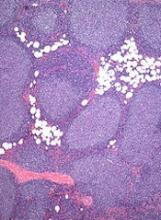The European Medicines Agency’s Committee for Medicinal Products for Human Use (CHMP) has recommended expanding the marketing authorization for obinutuzumab (Gazyvaro).
The new proposed indication is for obinutuzumab in combination with chemotherapy for patients with previously untreated, advanced follicular lymphoma (FL). This would be followed by obinutuzumab maintenance in patients who achieved a response.
The European Commission typically adheres to the CHMP’s recommendations and delivers its final decision within 2 to 3 months’ of the CHMP’s recommendation.
The decision will be applicable to all member states of the European Union, plus Iceland, Liechtenstein, and Norway.
If approved for this new indication, obinutuzumab will be authorized for use in the European Economic Area as follows:
- In combination with chlorambucil for the treatment of adults with previously untreated chronic lymphocytic leukemia and comorbidities making them unsuitable for full-dose fludarabine-based therapy.
- In combination with bendamustine, followed by obinutuzumab maintenance, for the treatment of patients with FL who did not respond to, or who progressed during or up to 6 months after, treatment with rituximab or a rituximab-containing regimen.
- In combination with chemotherapy, followed by obinutuzumab maintenance in responders, for the treatment of patients with previously untreated, advanced FL.
GALLIUM trial
The CHMP’s recommendation is based on results of the phase 3 GALLIUM trial, which were presented at the 2016 ASH Annual Meeting.
The study enrolled 1401 patients with previously untreated, indolent non-Hodgkin lymphoma, including 1202 with FL.
Half of the FL patients (n=601) were randomized to receive obinutuzumab plus chemotherapy (followed by obinutuzumab maintenance for up to 2 years), and half were randomized to rituximab plus chemotherapy (followed by rituximab maintenance for up to 2 years).
The different chemotherapies used were CHOP (cyclophosphamide, doxorubicin, vincristine, and prednisolone), CVP (cyclophosphamide, vincristine, and prednisolone), and bendamustine.
Patients who received obinutuzumab had significantly better progression-free survival than patients who received rituximab. The 3-year progression-free survival rate was 73.3% in the rituximab arm and 80% in the obinutuzumab arm (hazard ratio [HR]=0.66, P=0.0012).
There was no significant difference between the treatment arms with regard to overall survival. The 3-year overall survival was 92.1% in the rituximab arm and 94% in the obinutuzumab arm (HR=0.75, P=0.21).
The overall incidence of adverse events (AEs) was 98.3% in the rituximab arm and 99.5% in the obinutuzumab arm. The incidence of serious AEs was 39.9% and 46.1%, respectively.
The incidence of grade 3 or higher AEs was higher among patients who received obinutuzumab.
Grade 3 or higher AEs occurring in at least 5% of patients in either arm (rituximab and obinutuzumab, respectively) included neutropenia (67.8% and 74.6%), leukopenia (37.9% and 43.9%), febrile neutropenia (4.9% and 6.9%), infections and infestations (3.7% and 6.7%), and thrombocytopenia (2.7% and 6.1%).


